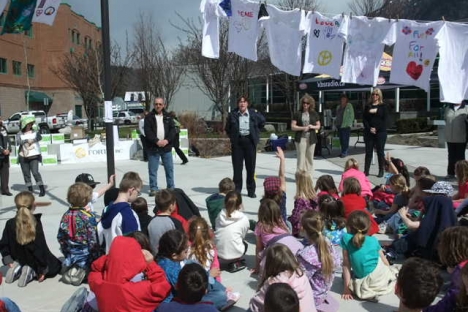Clothesline Event to prevent domestic violence slated for April 17
Prevention begins with community awareness and education. To this end, the third annual Clothesline Project display will be in front of City Hall on April 17.
“The Clothesline Project will display t-shirts decorated by children, women, and other community members, with anti-violence messages,” said Castlegar Victim Services co-ordinator Leanna Kozak. “We will also have support from our student partners at Selkirk College.”
Castlegar & District Community Services Society (CDCSS) and 19 community partners have developed prevention and intervention strategies to deal with domestic violence and abuse.
Research indicates that women are about five times as likely as men to be the victims of violence at the hands of a spouse or common-law partner.
But Statistics Canada reports that only 36 per cent of female victims tell the police, versus only 17 per cent of male victims. About an eighth of abused women do not tell anybody.
In 2011, 20 Castlegar, Trail and Nelson organizations joined in the Castlegar Domestic Violence Community Response Accord to make co-ordinated and consistent plans for responding to the abuse of women and children. This project was funded by gaming money from the province of B.C.
“We’re already getting more referrals, especially from health professionals, than we used to,” said Kozak. “This shows that the accord is working. In addition, we’re getting calls from other communities who are looking at it as a model.”
When someone does report abuse, it can trigger a number of interventions, depending on the situation.
When police are called, they, not the victim, decide whether charges are warranted. But the police can also help the victim and her/his children find a refuge, such as a Safe House (a CDCSS service), a Transition House in Trail or Nelson, or with family or friends.
The police may call in Victim Services, a CDCSS program, which can provide immediate counselling and advice, and referrals to other programs for follow-up. These may include one or more of Children Who Witness Abuse, Stopping the Violence, or Stopping the Violence Outreach at CDCSS.
A new program, Bridging for Women, will provide intensive workshops and supports to help traumatized women reconnect with the work force. These will occur twice a year, with the first to start this fall.
For mroe information, call 250-365-2104.


























Comments